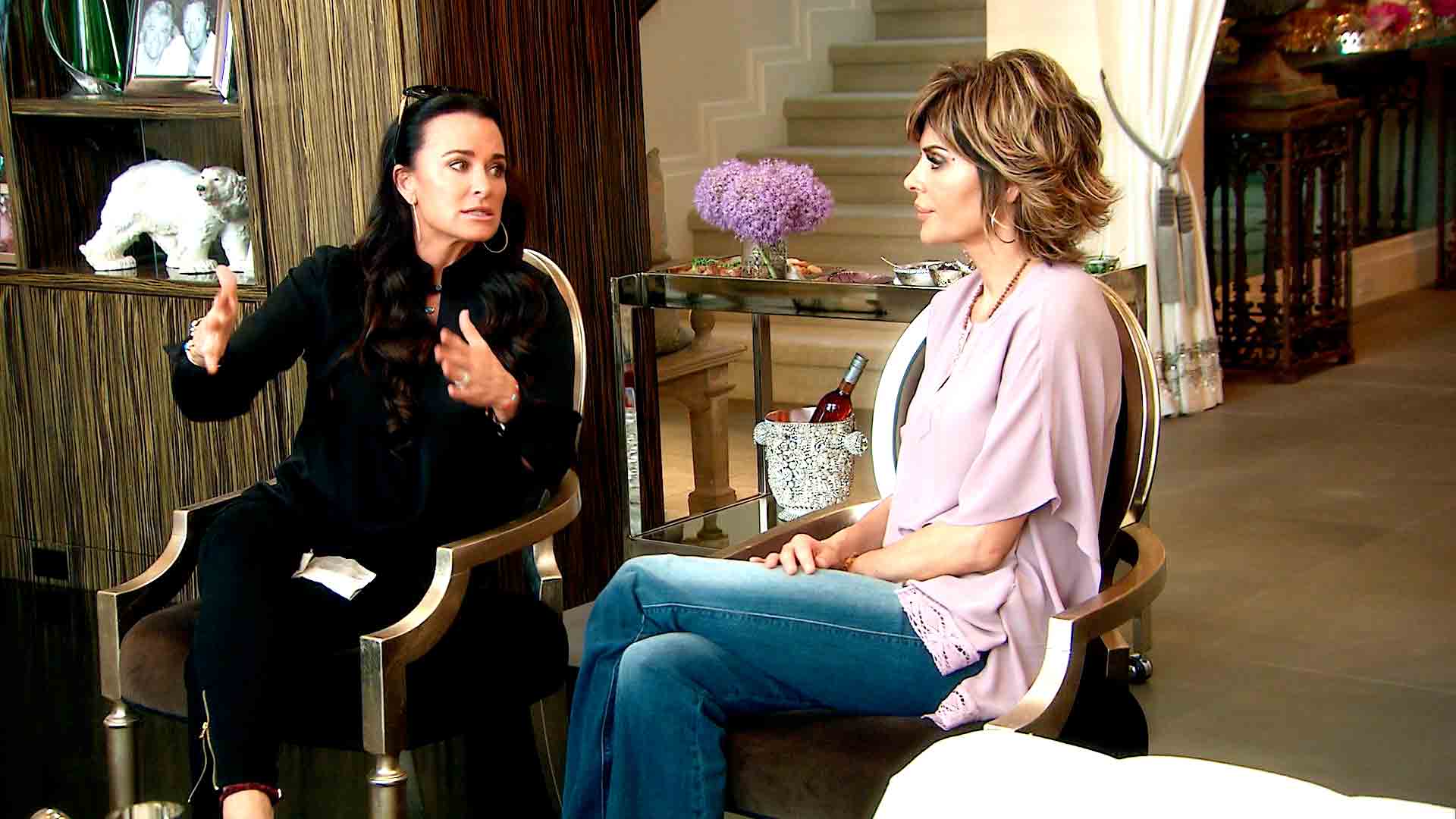Entertainment
RHOBH Teach Us What Not To Say To A Sick Friend

For two seasons, Real Housewives of Beverly Hills fans have watched with heartbreak as Dutch bombshell Yolanda Foster battles severe Lyme Disease. The former model has hidden little from the cameras: we’ve seen her bedridden and in tears, glimpsed inside her closets full of meds, and witnessed her undergoing endless procedures and treatments. Through it all, she's somehow remained incredibly positive.
As a person with a spine defect that causes me chronic pain, it’s been hard to watch Yolanda suffer. But it’s been even more frustrating to watch her fellow housewives be anything but supportive, doing everything from criticizing her appearance to suggesting she’s making the whole thing up. Unfortunately, the way they talk about her illness is indicative of the way many of us with chronic illness are treated and talked about, even by our friends.
Here are eight of their most cringe-worthy comments, why they’re wrong — and what could have been said instead. Next time you have a friend who is ill, especially with something serious, allow these "friends" to illustrate exactly what — and what not — to say.
1. “I mean, she’s got nothing on her face at all. Not even a little bit of under-eye cover up or anything. Maybe you could just take 10 seconds to do that?” – Lisa V.
What She Should Have Said Instead: “I know she doesn't feel good, so I really appreciate the effort she made to come out with us!”
When you’re really sick, you can’t “just” do anything. Even seemingly little things — like putting on eye makeup — can feel like running a marathon in quicksand. Yolanda was probably already pushing her limits just by showing up with clothes on to the event in question. Not to mention that, when you have a major health problem, your priorities change. Contouring may not be high on the to-do list.
2. "If she didn't put it out in a public way, she wouldn't get comments.” – Lisa R.
What She Should Have Said Instead: “I admire the courage it takes to be open about a personal issue.”
Keeping it private might be feasible if you have a minor health issue, but when you have a chronic problem, it's much harder (especially on reality TV!). And why should Yolanda have to lie? It’s been years since her symptoms began, which means it is as much a part of her everyday life as lip injections are a part of Lisa Rinna’s or tiny animals are part of Lisa Vanderpump’s. This is her reality, and she’s bravely sharing it. In the process, she’s also raising a ton of much-needed awareness but her disease.
3. “It is surprising to see Yolanda having such a good time, because the last time I had seen her with Eileen she was very, very sick.” – Lisa R.
What She Should Have Said Instead: “I’m glad Yolanda is having a good time!”
Some days with chronic illness are certainly better than others. When you’re having a rare good day, you’re sure to take advantage of it. Even if you do feel horrible, however, you don’t always have the option of curling up in the fetal position. The illness is chronic. It may never go away, which means you have to live your life somehow. You learn to put on a brave face — despite feeling like crap — and work within your limits.
4. “I’m so, like, confused. It seems strange to me that she’s like, happy selfie, sick selfie, happy selfie, sick selfie.” – Taylor
What She Should Have Said Instead: “Even though she looks good in this photo, that doesn’t mean she’s any less sick.”
Living in Beverly Hills, you’d think Taylor got the memo that what you see on screen doesn’t equate to reality. Yolanda looking fab in a photo does not mean she feels fab. Plus, with any chronic condition, though you generally feel like junk, exactly how junky can vary wildly from day to day, like a choose-your-own-adventure of lame symptoms. One day you may feel like a semi-normal human; the next, like you’ve been hit by a Mack truck. There are so many factors influencing how you feel at any given moment: meds, sleep, activities, diet, etc., that it’s hard to know what makes things better or worse — nevermind control them.
5. “Being in Yolanda’s condo is reminding me of my sister Connie’s battle with cancer. She had a lot of similar vitamins and minerals — I mean, just boxes and boxes of them — and it’s bringing up a lot of unpleasant stuff for me.” – Eileen
What She Should Have Said Instead: “This hits home, so I want to be extra supportive. What can I do to help?”
You want to relate and to let your friend to know that they are not alone. That’s not a bad thing. Just be careful: this is not about you, or your sister, or your second cousin, twice removed. This is about the person who is suffering. Sure, it's hard for you to see her like this, but imagine how hard it is for her to be like this. She needs your undivided support.
6. “I’m just questioning it. She was having some type of anesthetic. She had the stem cell transplant. It’s just a lot of stuff. ” – Lisa V.
What She Should Have Said Instead: “It must be frustrating to have to try all these different treatments and still not feel better.”
When the standard course of treatment isn't working well, you do two things: you treat the symptoms and you seek out alternative treatment options. A systemic issue like Lyme disease affects everything from your brain to your joints. You have to attack the problem from all sides. Yolanda’s willingness to try a variety of treatments should speak only to her determination to get better, not to her faking it. Stem cell transplants aren't anyone's idea of fun.
7. “So, is she feeling better now ... is she feeling better? I’m confused.” – Kyle
What She Should Have Said Instead: "I know there are a lot of ups and downs. Is she showing any signs of improvement lately?”
Constantly probing whether someone is better may seem thoughtful, but it’s actually pretty insensitive to the reality of chronic illness. Yolanda doesn't know when — or if — it will get better. Believe me, you'll know when a chronically sick friend is better. She’ll be outside your window, yelling into a megaphone while tap-dancing atop a parade float.
8. “I'm just going to read you something: 'Munchausen syndrome fits within the subclass of fictitious disorders… wherein those affected feign disease, illness or psychological trauma to draw attention, sympathy or reassurance to themselves.'” – Lisa R.

What She Should Have Said Instead: Nothing.
Doubting someone’s illness is one of the cruelest things you can do. It invalidates and belittles very real, horrific suffering. When someone’s experience of illness doesn’t fit in with your understanding of what it should be, that doesn’t mean it’s fake. Chronic illness rarely fits into a tidy little box. Plus: “attention, sympathy, or reassurance”? If only Yolanda was receiving those things from her friends, it might be worthwhile to pretend.
If you’re still not sure of the right thing to say to a sick friend, “how can I help?” is always a good place to start. As Yolanda points out during the show: “I wish they would use their energy that they’re wasting talking about me — use it to come take care of me."
Image: Valerie Macon/Getty Images Entertainment; Giphy (8)